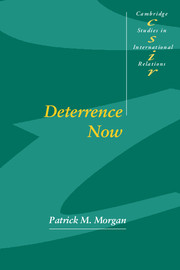Crossref Citations
This Book has been
cited by the following publications. This list is generated based on data provided by Crossref.
Morgan, Patrick M.
2004.
The Forceful Peacemaker.
International Studies Review,
Vol. 6,
Issue. 3,
p.
499.
Kolodziej, Edward A.
2005.
Security and International Relations.
Quackenbush, Stephen L.
2006.
Not Only Whether but Whom.
Journal of Conflict Resolution,
Vol. 50,
Issue. 4,
p.
562.
Zagare, Frank C.
2006.
Deterrence Is Dead. Long Live Deterrence.
Conflict Management and Peace Science,
Vol. 23,
Issue. 2,
p.
115.
SPERANDEI, MARIA
2006.
Bridging Deterrence and Compellence: An Alternative Approach to the Study of Coercive Diplomacy.
International Studies Review,
Vol. 8,
Issue. 2,
p.
253.
Asal, Victor
and
Beardsley, Kyle
2007.
Proliferation and International Crisis Behavior.
Journal of Peace Research,
Vol. 44,
Issue. 2,
p.
139.
Coletta, Damon
2007.
Unipolarity, Globalization, and the War on Terror: Why Security Studies Should Refocus on Comparative Defense.
International Studies Review,
Vol. 9,
Issue. 3,
p.
385.
BRAUMOELLER, BEAR F.
2008.
Systemic Politics and the Origins of Great Power Conflict.
American Political Science Review,
Vol. 102,
Issue. 1,
p.
77.
Roehrig, Terence
2008.
Restraining the Hegemon: North Korea, the United States and Asymmetrical Deterrence.
Pacific Focus,
Vol. 20,
Issue. 2,
p.
7.
Cimbala, Stephen J.
2009.
Triad of terror: post-START reductions in broader context.
European Security,
Vol. 18,
Issue. 2,
p.
201.
Seliktar, Ofira
and
Dutter, Lee E.
2009.
Assessing the Rationality of Autocrats: The Case of Saddam Hussein.
International Journal of Intelligence and CounterIntelligence,
Vol. 22,
Issue. 2,
p.
275.
2009.
Death by Moderation.
p.
216.
Roehrig, Terence
2009.
North Korea and the US State Sponsors of Terrorism List*.
Pacific Focus,
Vol. 24,
Issue. 1,
p.
85.
Onuf, Nicholas
2009.
Friendship and Hospitality: Some Conceptual Preliminaries.
Journal of International Political Theory,
Vol. 5,
Issue. 1,
p.
1.
Tunç, Hakan
2009.
Preemption in the Bush Doctrine: A Reappraisal.
Foreign Policy Analysis,
Vol. 5,
Issue. 1,
p.
1.
2009.
Death by Moderation.
p.
28.
TRAGER, ROBERT F.
2010.
Diplomatic Calculus in Anarchy: How Communication Matters.
American Political Science Review,
Vol. 104,
Issue. 2,
p.
347.
Hynek, Nik
2010.
Missile Defence Discourses and Practices in Relevant Modalities of 21st-Century Deterrence.
Security Dialogue,
Vol. 41,
Issue. 4,
p.
435.
Lupovici, Amir
2010.
The Emerging Fourth Wave of Deterrence Theory-Toward a New Research Agenda.
International Studies Quarterly,
Vol. 54,
Issue. 3,
p.
705.
Adler, Emanuel
and
Pouliot, Vincent
2011.
International practices.
International Theory,
Vol. 3,
Issue. 1,
p.
1.





